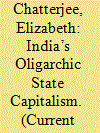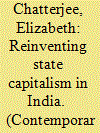| Srl | Item |
| 1 |
ID:
111514


|
|
|
|
|
| Publication |
2012.
|
| Summary/Abstract |
This article presents the Indian electricity sector as a case study of the evasion of responsibility in public policy. India's electricity policy repeatedly fails to meet its own targets and is universally lambasted as inadequate. The state appears aware of many of the reasons for these failures, yet policies have consistently failed to make effective corrections. Part of the explanation for this institutional and policy stasis lies in the pervasive shirking of responsibility by actors throughout the electricity sector. The sector is analysed to explore the mechanisms through which responsibility is displaced, deflected or dissipated. These mechanisms include 'agency', 'presentational' and 'policy' strategies, which are both pre-emptively and reactively deployed. Using these strategies, responsibility is shifted through (1) institutional architecture which formally delegates power to other actors, especially exploiting the ambiguity in federalism, sectoralism, privatization and decentralization; (2) rhetorical displacement of blame onto other actors or 'exogenous' factors and (3) everyday policy procedures and bureaucratic practices designed to distance officials from decision making. By negating the requirement for institutional and analytical responsiveness, these evasions of responsibility perpetuate systemic failures and undermine the credibility of the Indian state.
|
|
|
|
|
|
|
|
|
|
|
|
|
|
|
|
| 2 |
ID:
189712


|
|
|
|
|
| Summary/Abstract |
Almost nine years into Narendra Modi’s premiership, there is little sign of an ideological commitment to the free market at the apex of the Indian state. Instead, this article characterizes India’s developmental model as a form of state capitalism, structured by the government’s direct influence on economic relationships. The Modi government took office in the midst of a legitimacy crisis generated by the state-dominated financial system. In response, it has fostered an increasingly oligarchic state capitalism, aiming to mobilize private resources through a narrow alliance of state and business interests. This strategy entails serious economic distortions and political risks.
|
|
|
|
|
|
|
|
|
|
|
|
|
|
|
|
| 3 |
ID:
152352


|
|
|
|
|
| Summary/Abstract |
Despite three decades of liberalization, the public sector’s contribution to the Indian economy remains crucial but underappreciated. Particularly striking is the resilience of central public sector enterprises. The best of these have been reinvented: retrofitted for the market era, exposed to competition and endowed with at least the trappings of corporate governance. Elsewhere in the world, such state-market hybrids have been seen as characteristic of a powerful new model: ‘state capitalism 2.0’. How, then, do these reinvented central enterprises fit within India’s contemporary liberalization process? From the vantage point of the energy sector, in which India’s largest state-owned enterprises (SOEs) predominantly lie, this article seeks to shed light on key continuities and changes in India’s underlying regime of state capitalism. It argues that the most successful central SOEs institutionalize a pragmatic variant of liberalization, in which public versus private ownership matters less than ideas of managerial efficiency and market discipline. Yet this does not amount to a coherent alternative to deregulation or first-generation state capitalism. Instead these enterprises are treated with an admixture of neglect and short-term exploitation, milked for resources to fund a wide system of subsidies. India’s second-generation state capitalism is distinguished from its older incarnation less by the declining role of the state than by the increasingly pro-business nature of these transfers.
|
|
|
|
|
|
|
|
|
|
|
|
|
|
|
|